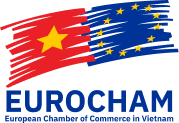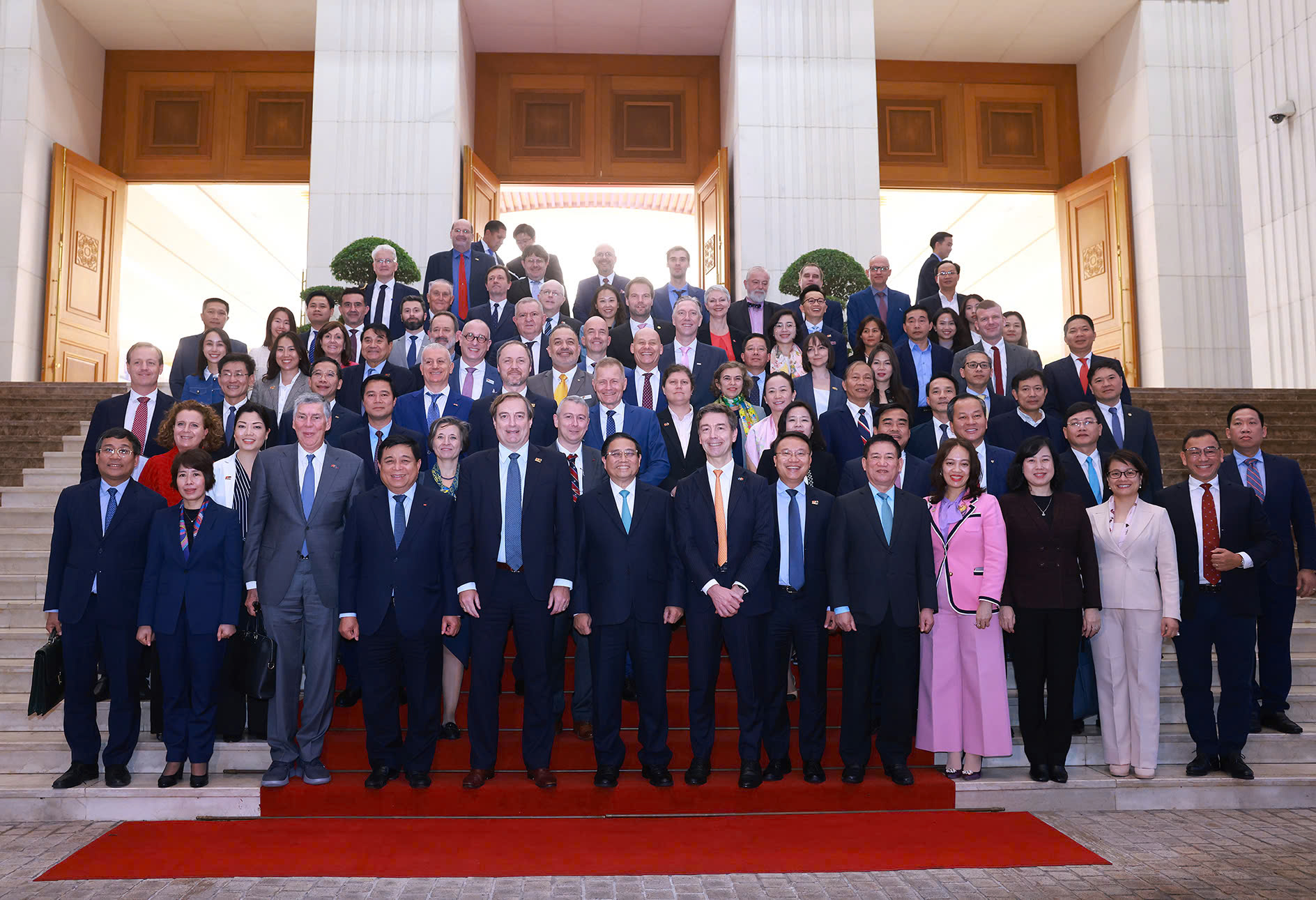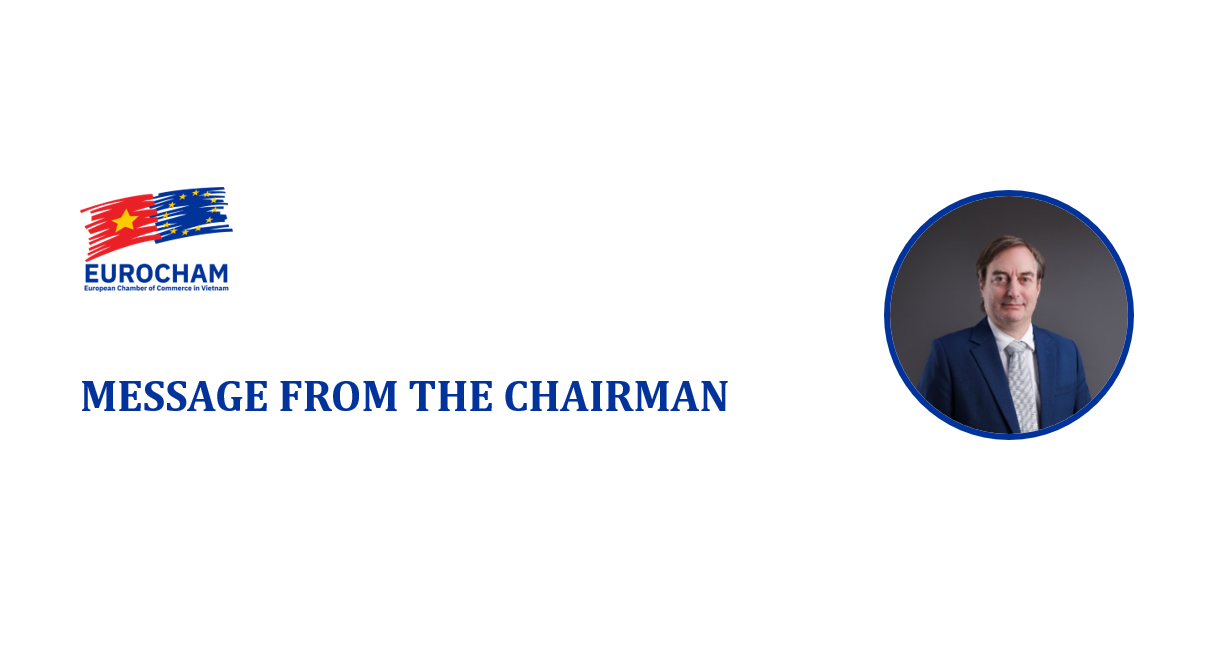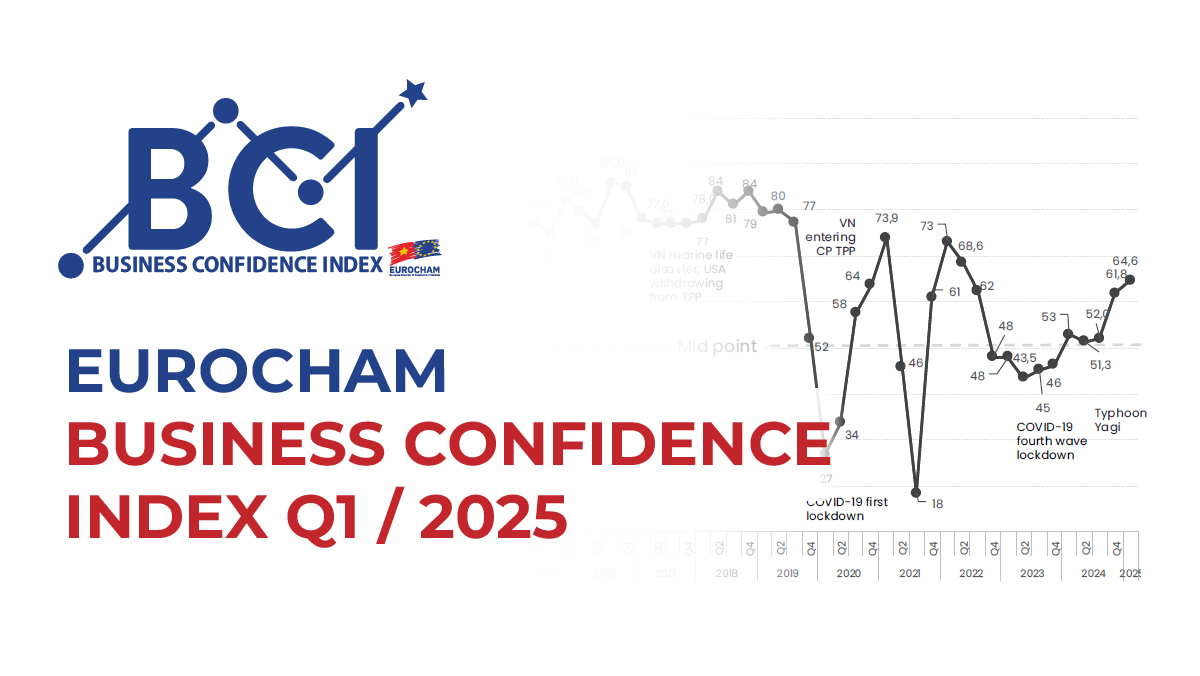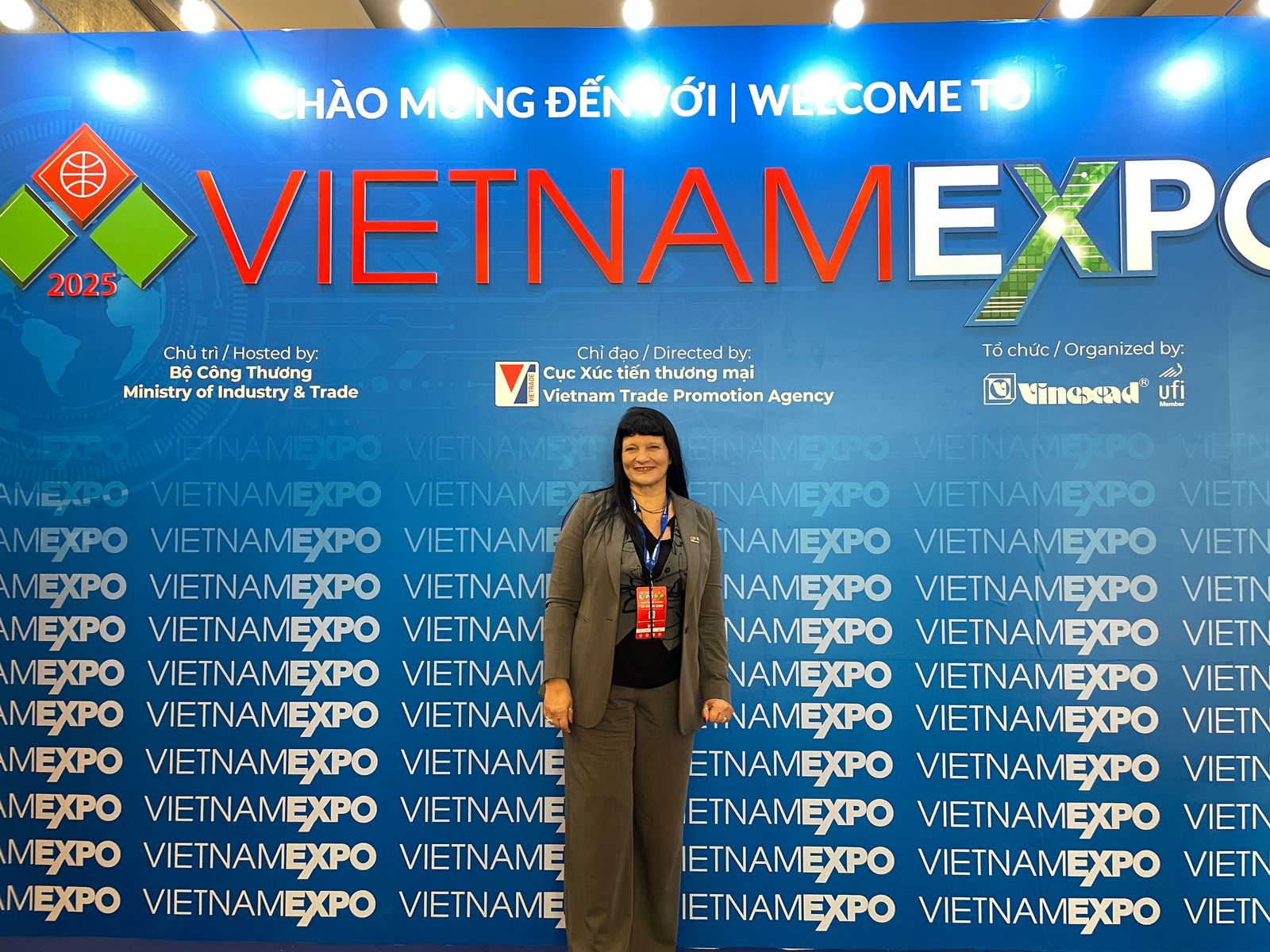The European Chamber of Commerce in Vietnam (EuroCham) reaffirmed its pivotal role in fostering EU-Vietnam economic ties through a high-level dialogue with Prime Minister Phạm Minh Chính. The event saw the participation of several Deputy Prime Ministers, leaders from central government ministries, representatives from local authorities, national chambers of commerce of EU member countries, ambassadors and diplomatic missions from European countries in Vietnam as well as European businesses.
The strategic discussion, held at the Government Headquarters on Sunday, 2 March, provided a critical platform for open discussions on trade and investment priorities, regulatory improvements, and opportunities to enhance Vietnam’s appeal to European investors, including key directives from Prime Minister Phạm Minh Chính instructing to amend the on-the-spot import-export regulations as soon as possible in response to business concerns and to ensure that the legal framework is amended to facilitate investor access to renewable energy.
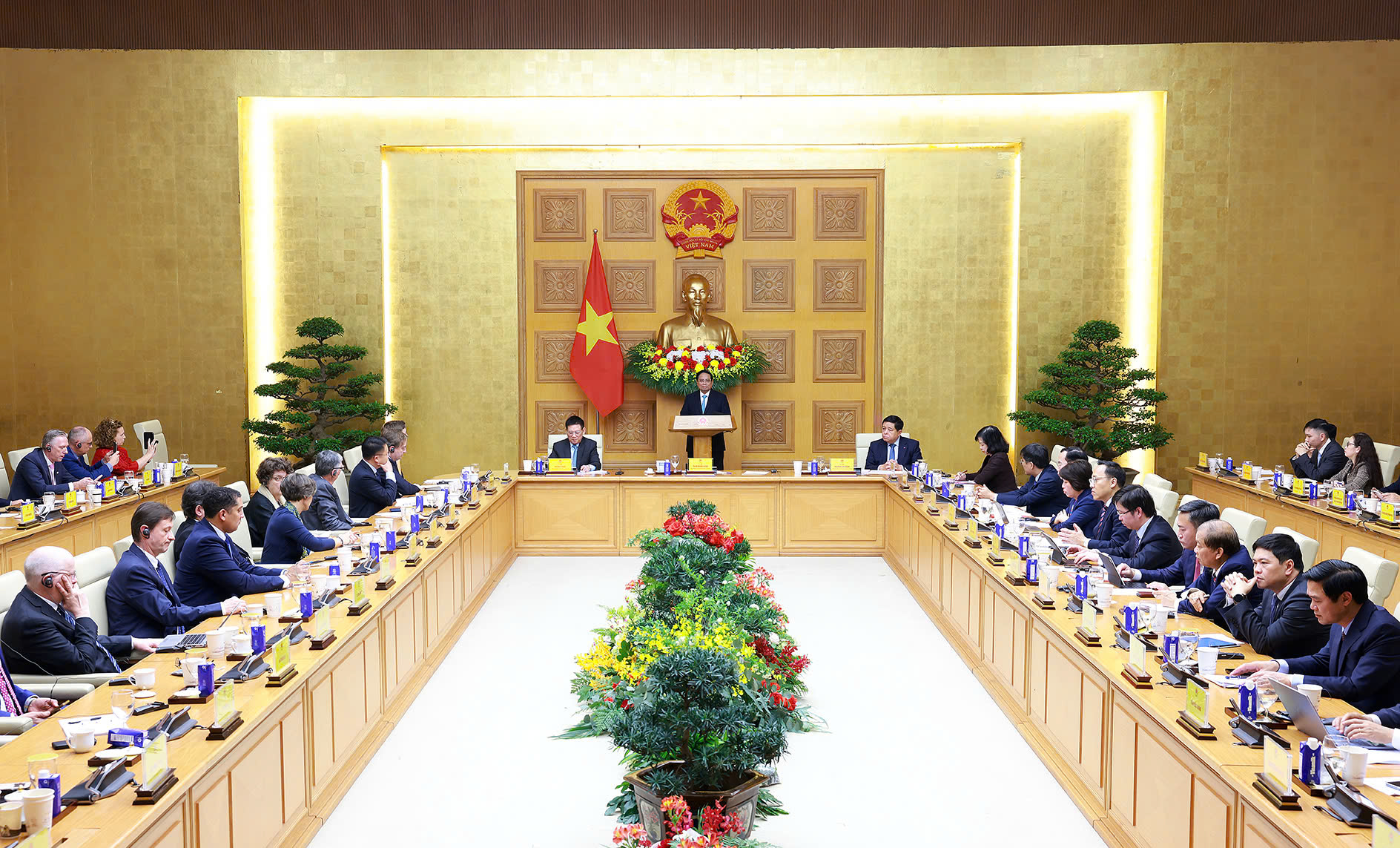
Strengthening Vietnam’s investment climate and business environment
A key theme of the dialogue was strengthening Vietnam’s investment climate for long-term economic growth. EuroCham underscored the importance of a stable and transparent legal framework, advocating for regulatory reforms that would enhance Vietnam’s attractiveness as an investment destination.
Drawing a parallel to Vietnam’s resilience during Typhoon Yagi, Bruno Jaspaert, EuroCham Vietnam Chairman, noted: “During Typhoon Yagi, no houses in Hai Phong collapsed because they were built on solid foundations. Similarly, Vietnam must establish a robust legal framework to solidify its position as a top investment destination. Streamlining administrative procedures and reducing regulatory burdens will not only attract investment but also drive long-term economic stability.
“Since 2011, EuroCham has published the quarterly Business Confidence Index (BCI) to assess business sentiment on Vietnam’s economic outlook. In our latest BCI report, 3 in every 4 European businesses recommended Vietnam as an investment destination. However, to further enhance Vietnam’s attractiveness, we must streamline administrative procedures to remove persistent bottlenecks.”
To enhance Vietnam’s attractiveness to foreign investors, EuroCham called for three key areas for improvement, as consistently highlighted by businesses in the BCI: (1) reducing regulatory burdens on businesses, (2) streamlining company establishment and investment registration processes nationwide, and (3) simplifying work permit requirements to attract international expertise and align Vietnam’s visa regulations to apply consistently to all EU member states.
Additionally, EuroCham called for greater national branding efforts to position Vietnam as both a dynamic investment hub and a competitive international business destination.
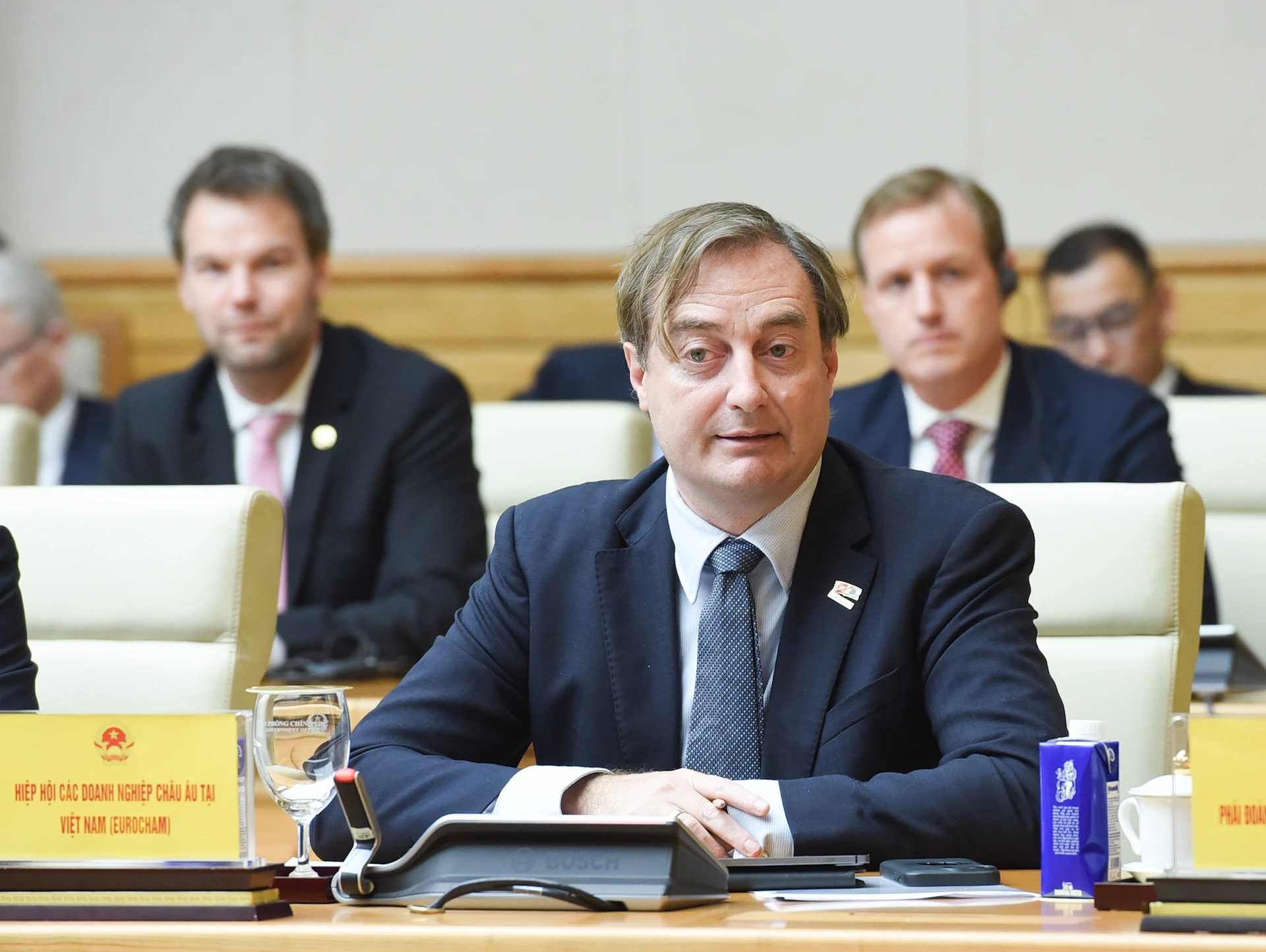
Government’s commitment to reform
The discussions were met with strong engagement from Prime Minister Phạm Minh Chính, who reaffirmed Vietnam’s commitment to fostering a business-friendly environment and encouraged European investment in high-tech industries, infrastructure, and renewable energy.
Emphasising Vietnam’s ambition to achieve 8% GDP growth this year, the Prime Minister called for stronger collaboration between businesses and government ministries to create a thriving investment climate. He underscored the government’s dedication to addressing business concerns and enhancing administrative efficiency, pledging continued efforts to streamline procedures and support enterprises in expanding their operations in Vietnam.
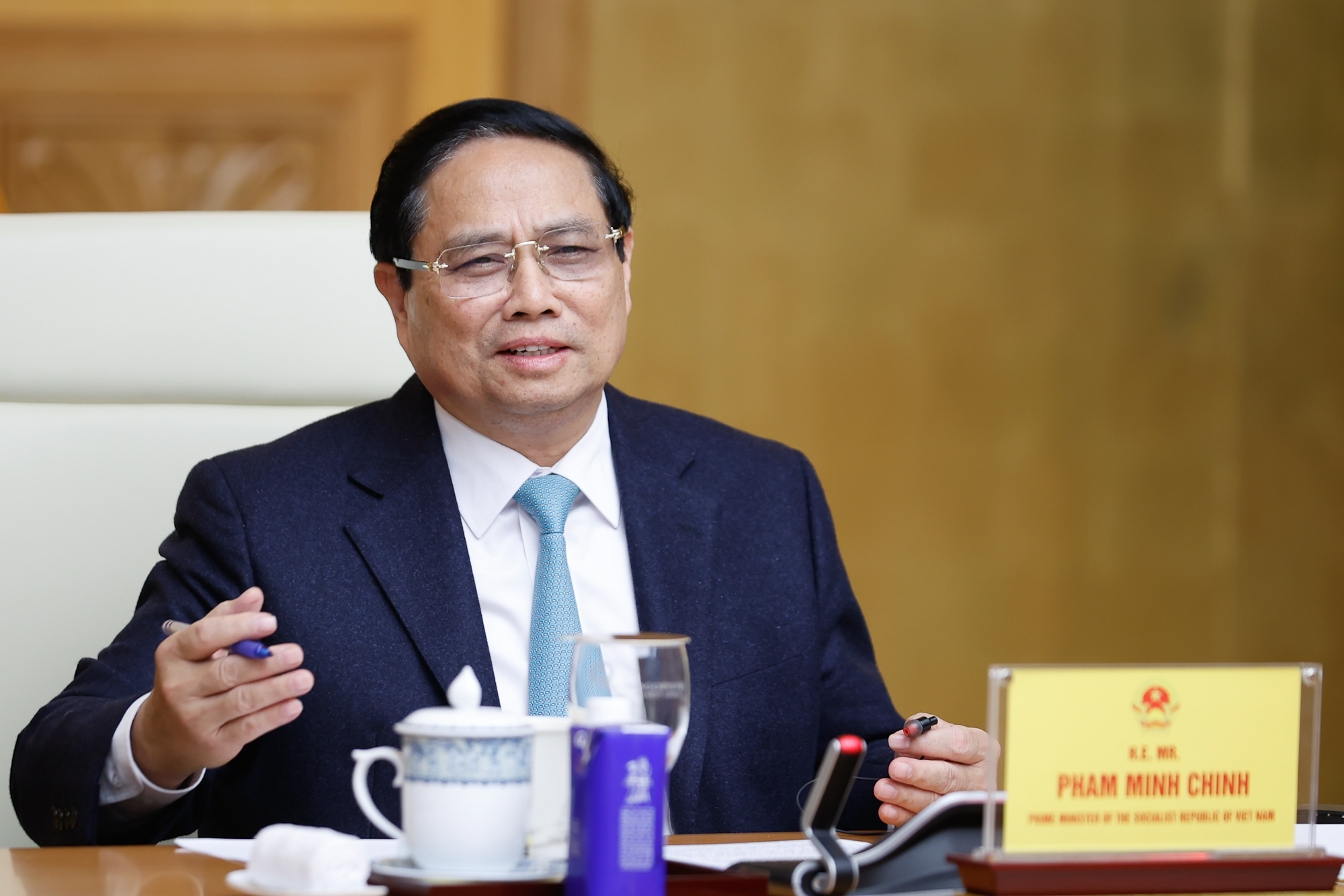
European Union Ambassador to Vietnam Julien Guerrier echoed these sentiments, emphasising the EU’s dedication to supporting Vietnam’s green transition and economic modernisation. He highlighted the need for clear and predictable regulations, uniform application of the law across all levels of administration and provinces and alignment with international standards. This will help Viet Nam to unlock the full potential of EU-Vietnam trade and investment cooperation.
Ambassador Julien Guerrier reaffirmed Europe’s readiness to bring more investment, more technology, and more opportunities to Vietnam. EU-Vietnam trade has already reached €68 billion in 2024, with the EU-Viet Nam Free Trade Agreement (EVFTA). The full and effective implementation of EVFTA is the strong foundation for the EU-Vietnam partnership to go much further. Further progress means securing an inviting environment for investors in Vietnam with clear and predictable rules, consistent application including across provinces, and faster decision-making. The EU is committed to securing the full ratification of the EU-Vietnam Investment Protection Agreement (EVIPA) within the best possible timeframe. Ambassador Guerrier welcomed Vietnam’s ongoing administrative reforms and the call of Vietnam’s leaders for faster decision making, for reducing business cost, and for simplifying the business environment.
Additionally, the Ambassador shared preliminary details about the intended upcoming visits by high-level EU leaders, including European Commission President Ursula von der Leyen, Trade Commissioner Maroš Šefčovič, and International Partnerships Commissioner Jozef Síkela, aimed at furthering bilateral cooperation on the occasion of the 35th anniversary of EU-Vietnam diplomatic relations.
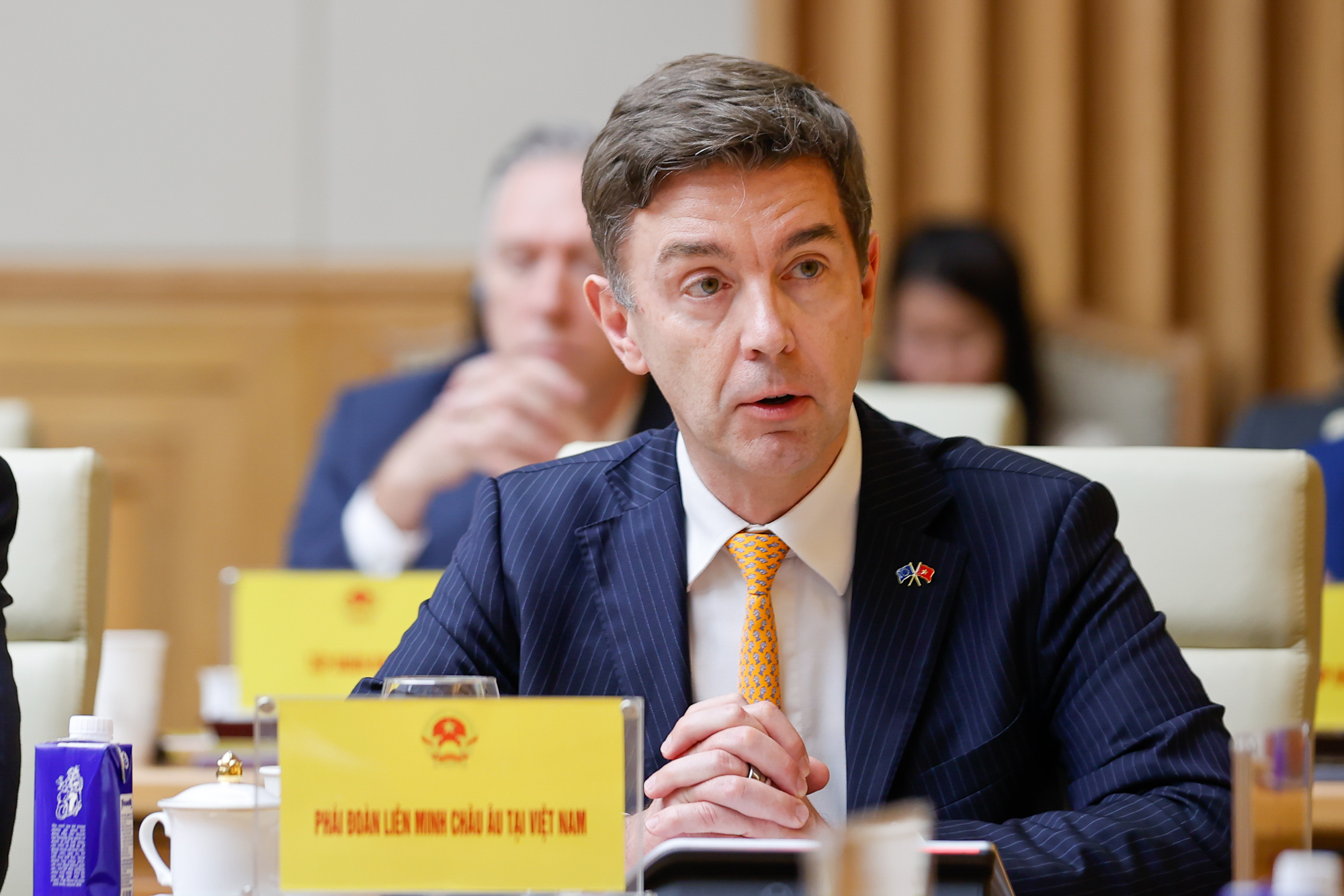
Sector-specific insights: industry leaders weigh in
During the meeting, EuroCham presented additional insights from its latest business survey, highlighting key challenges faced by European enterprises in Vietnam. Among the top concerns was the implementation of Extended Producer Responsibility (EPR), where businesses lack clarity on cost structures and compliance deadlines.
Nguyễn Hải Minh, Vice-Chairman of EuroCham, expressed appreciation to the Ministry of Natural Resources and Environment for promptly issuing Circular 07/2025, which provides guidance on the Environmental Protection Law, including regulations on EPR (Extended Producer Responsibility), helping businesses better understand the cost structure and compliance deadlines.
Other concerns included the impact of the Special Consumption Tax and Global Minimum Tax, with calls for tax policies that ensure Vietnam remains competitive for international investment, as well as the need for standardised investment criteria and stable green energy access in industrial real estate development.
Another key regulatory issue raised was on-the-spot import-export policies, with real-life case studies from businesses illustrating the bottlenecks and challenges they pose to both daily operations and long-term investment strategies. Mr. Minh stressed that if this is resolved, it will help liberalise trade flows and contribute to building Vietnam into a new logistics hub in the region, alongside Singapore. In response, Prime Minister Phạm Minh Chính reaffirmed that policies must be rooted in practical realities, assessed by their effectiveness, and adjusted accordingly. Specifically addressing these regulations, he instructed Deputy Prime Minister Hồ Đức Phớc to amend the relevant decree as soon as possible, stating that if feasible, changes should be implemented immediately – even as early as the following day.
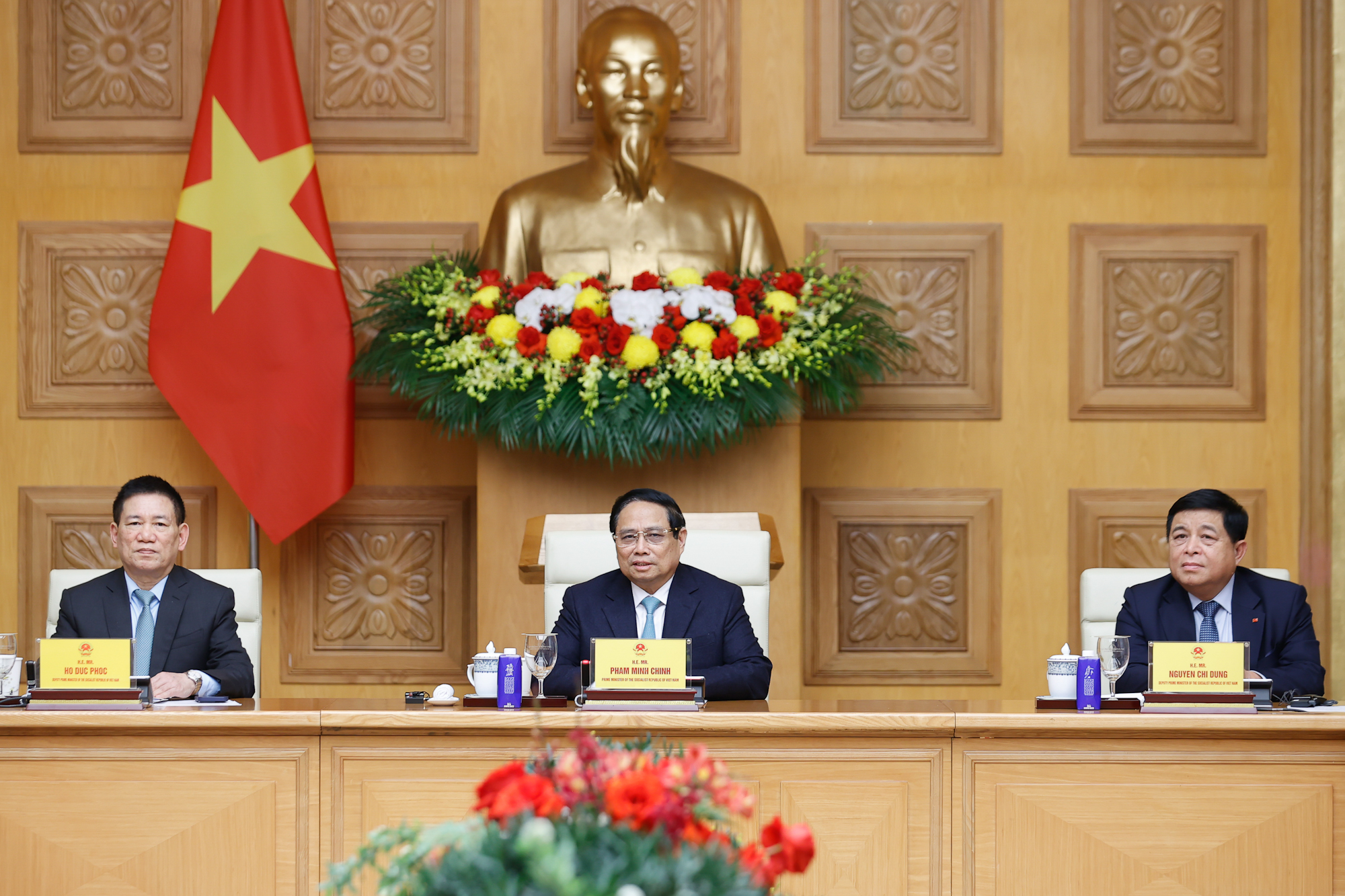
Throughout the dialogue, business leaders, representing key sectors of European investment in Vietnam, provided specific recommendations for improving the business and investment environment. At the same time, central government officials actively responded to these suggestions.
Sustainable investment in industrial zones and logistics
Mr. Koen Soenens from DEEP C emphasised the need for consistency in investment criteria across provinces to allow businesses to easily expand production. Improving customs procedures and minimising disruptions in the supply chain were also highlighted as key factors in enhancing the efficiency of imports, exports, and logistics. Lastly, he advocated for amendments to the current law on auto consumption of renewable energy, enabling industrial parks to supply more green energy to foreign direct investors – a key demand among today’s investors.
Ms. Esra Bora from CMA-CGM also stressed Vietnam’s role in regional trade and called on the government to support efforts to reduce supply chain congestion. She also urged continued government backing for sustainable transport initiatives, including Vietnam’s first zero-emission electric barge service between Binh Duong and Cai Mep, which eliminates 778 tons of CO₂ annually.
Expressing support, Deputy Prime Minister Hồ Đức Phớc emphasised the reform of customs procedures through the green-yellow-red channel model and the move toward smart customs in line with ASEAN standards. He committed to continuing to listen closely to businesses’ feedback to guide customs authorities in addressing procedural obstacles in a timely and appropriate manner.
Technology development and innovation
Representing Bosch, Andre de Jong expressed a desire to strengthen research and development (R&D) capabilities in Vietnam, particularly in the fields of electric vehicles and advanced AI technology. He suggested reducing barriers to the import of used equipment for product research and development purposes, which are currently hindering the development of the domestic technology ecosystem. This would help accelerate innovation and enhance the competitiveness of the industry.
Deputy Minister of Science and Technology Bùi Hoàng Phương affirmed that Vietnam will prioritise the development of AI, semiconductor technology, and cloud computing. At the same time, the government will offer personal income tax exemptions and a five-year visa extension to attract high-tech professionals. The development direction for the aforementioned priority areas is stipulated in the Digital Technology Industry Law and the Science and Technology and Innovation Law, which are expected to be presented by the Ministry of Science and Technology to the National Assembly in May this year. Specifically, the Science and Technology and Innovation Law is scheduled for review and feedback at the 9th session (May 2025) and is expected to be passed at the 10th session four months thereafter. The Digital Technology Industry Law is expected to be passed in May 2025.
Sustainable agriculture and food production
Mr. Maximilian Rummert from Bayer emphasised the need to protect business information and intellectual property rights to encourage innovation and shorten the time to market. He also suggested promoting the use of biotechnology for crop protection, agricultural drones, and biotechnological innovations to address environmental pressures.
Minister of Agriculture and Environment Đỗ Đức Duy committed to continuing efforts to improve the branding of Vietnamese agricultural products, protect intellectual property rights, and simplify procedures for expanding manufacturing plants under the 2024 Land Law. He also mentioned that the government is working to standardise agricultural criteria in line with European standards to enhance global competitiveness.
Healthcare and pharmaceuticals
With the Vietnamese pharmaceutical market reaching 8 billion euros in 2023 and expected to grow by 11% by 2030, Mr. Burak Pekmezci from Sanofi called for closer collaboration between the government and the entire pharmaceutical industry to modernise and simplify management processes. He also suggested applying international mechanisms to ensure a stable supply of essential medicines, avoid treatment disruptions, and accelerate the introduction of new drugs. Additionally, he called for the revision of the Infectious Disease Prevention Law to improve access to vaccines and advanced preventive solutions for Vietnam.
Minister of Health Đào Hồng Lan confirmed that the new Pharma Law, effective from July 1, 2025, will shorten the drug and vaccine approval process from five years to just eight months. The government is also actively working on drafting relevant decrees and circulars, and the Minister encourages businesses to actively collaborate closely with the Ministry of Health. She also emphasised the need to harmonise standards with European regulations to accelerate the approval process for medical products.
Green energy transition
During the dialogue, many business leaders shared their expectations and proposals for the development of new technologies and policy reforms aimed at accelerating the green energy transition in Vietnam. Mr. Nguyễn Phan Đính from EDPR emphasised the importance of long-term policies to attract investment in renewable energy. The inspection conclusion #1027/KL-TTCP highlights that 173 solar and wind power projects, which have been operational for 4-5 years, are now at risk of retroactive adjustments to their FIT prices and COD conditions. He called for increased investment in solar, wind, and energy storage, supported by legal frameworks such as Decree 80 and Decree 135, to restore market confidence, ensure financial stability, and help Vietnam achieve its Net-Zero goal.
Deputy Minister of Industry and Trade Nguyễn Hoàng Long responded positively to the business recommendations regarding stable access to green power. He emphasised that the government plans to issue new decrees aimed at developing between 80,000 and 100,000 MW of renewable energy, while also promoting the “self-produced, self-consumed” electricity model to optimise clean energy capacity.
Customs and tax policy
In the manufacturing sector, Mr. Wietse Mutters from Heineken proposed to postpone the excise duties increase to 2027 to avoid negative impacts on GDP, national revenue, and business competitiveness. He asked the government to start actively engaging with the industry association in collaboration with the MOIT to develop a holistic and well-thought through proposal. He also called for regulations to support wastewater reuse and circularity, including enabling cans to be recycled in Vietnam for the same application.
As Vietnam continues to assert its position as a global investment hub, enhancing trade facilitation has become critical. Ms. Claudia Anselmi from Hung Yen Textile & Dyeing Co., Ltd. emphasised the need to clarify policies and adjust regulations to support on-the-spot import-export. She also pointed out the issues in the current VAT refund system, which increases costs and impacts business competitiveness. Addressing these issues will help ensure that Vietnam remains an attractive destination for high-value manufacturing investments.
Deputy Minister of Finance Nguyễn Thị Bích Ngọc mentioned that the Ministry is working with local authorities to expedite investment certification issuance and adjust tax policies to better align with the actual needs of businesses.
Opportunities await: strong collaborations onward
In his closing remarks, Prime Minister Phạm Minh Chính emphasised the Vietnamese government’s determination to reform administrative procedures and create favourable conditions for European businesses to invest and develop in Vietnam. He expressed his appreciation upon hearing Mr. Bruno Jaspaert, EuroCham Chairman, say that Vietnam is “a second home,” and he hoped that the European business community also feels this confidence and sincerity.
The Prime Minister affirmed: “Vietnam is committed to creating a transparent, stable, and favorable investment environment for foreign businesses. We highly appreciate the contributions of the European business community and will continue to listen, improve, and innovate for the sustainable development and mutual benefits of both sides.”
The Prime Minister also shared his agreement with Mr. Bruno Jaspaert’s viewpoint that while challenges are always present, together, solutions can be found. Regarding administrative reform, the Prime Minister assured: “The government is committed to boldly addressing bottlenecks in administrative procedures, customs, and compliance costs. All difficulties will be resolved according to a specific roadmap: ministries will address issues by March, the government by April, and the National Assembly in May if necessary.”
Prime Minister Phạm Minh Chính concluded: “The rapidly changing global context requires both Vietnam and the EU to take a flexible and proactive approach. We might live 100 years, but we need a vision that spans 1,000 years, not only in investment but also in long-term cooperation, with people and businesses at the center.” He proposed a symbolic initiative to celebrate 35 years of diplomatic relations between Vietnam and the EU: “Let us set a goal to increase economic growth from the European business community and from Vietnam, each by at least 8% this year, aiming for double digits in the future.”
Looking ahead, EuroCham reaffirmed its commitment to working closely with the Vietnamese government to implement practical solutions that address these challenges. Bruno Jaspaert remarked: “We are not just here to present challenges but to work collaboratively on solutions. Our goal is to contribute to reducing administrative barriers by at least 30%, aligning with Party General Secretary Tô Lâm’s call for Vietnam’s broader economic reform objectives. Through our Whitebook, which is set to launch next month, EuroCham will provide concrete recommendations to address these issues and foster an even more attractive investment climate.”
As Vietnam and the EU mark 35 years of diplomatic relations, this high-level dialogue underscored the mutual commitment to strengthening economic ties. EuroCham remains dedicated to bridging European businesses with Vietnamese policymakers to drive sustainable economic growth. With a clear roadmap for regulatory improvements and enhanced collaboration, the potential for EU-Vietnam trade and investment continues to expand, promising a future of shared prosperity and strengthened bilateral relations.
###
For media enquiries, please contact:
EuroCham Vietnam Media & Communications Officer
Ms. Tram Hoang – tram.hoang@eurochamvn.org
